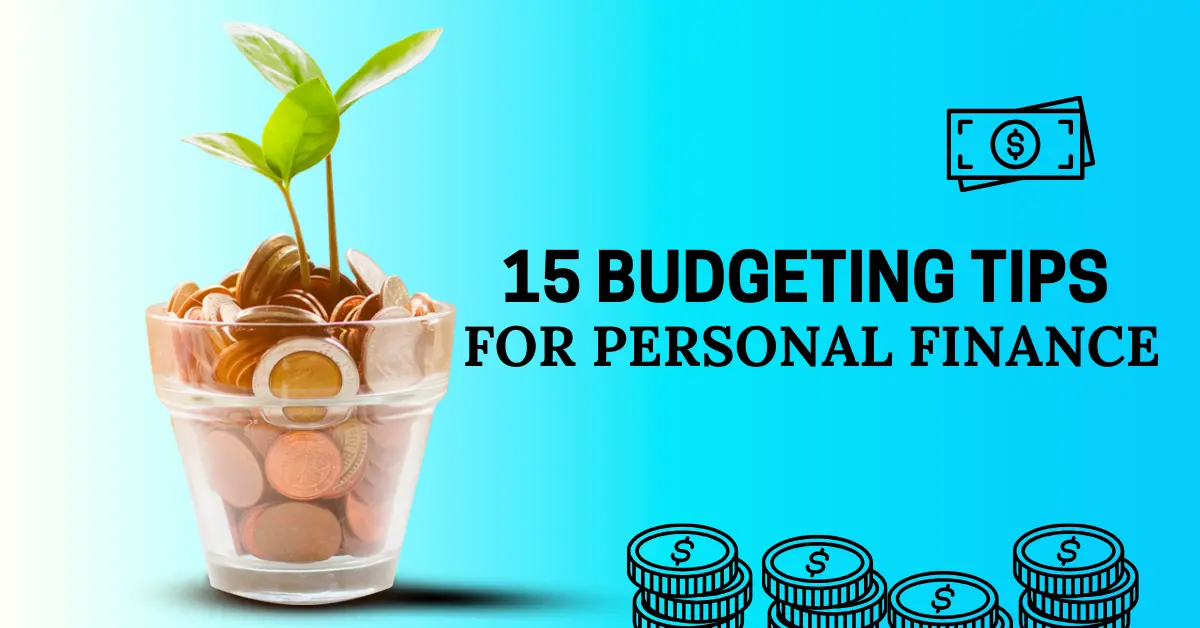
Budgeting Tips for Personal Finance
Budgeting is essential for managing your finances effectively. Start by tracking your income and expenses to see where your money goes. Set clear financial goals, like saving for emergencies or paying off debt. Create a budget by categorizing your spending into essentials, such as rent and groceries, and non-essentials, like entertainment. Ensure you adhere to your budget and make adjustments when necessary. Think about utilizing budgeting apps or tools to keep your finances organized. Regularly review your budget to ensure you’re on track and meeting your financial goals.
What is budgeting?
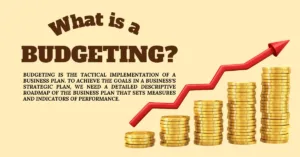
Budgeting is the process of planning how to spend your money. It involves tracking your income, like your salary, and your expenses, such as rent and groceries. By creating a budget, you can see where your money goes, set financial goals, and make sure you have enough for important things. Budgeting helps you avoid overspending, save for the future, and make better choices with your money.
Budgeting Tips for Personal Finance
Money matters can be tricky, but with the right approach, anyone can get better at managing their finances. In this blog post, we’ll share some helpful budgeting tips for personal finance skills. These tips are easy to understand and put into practice, so you can start making positive changes right away.

Know Your Income and Expenses
The first step in budgeting is to understand how much money you have coming in and going out. This means:
- Write down your total monthly income from all sources (job, investments, etc.)
- List all your monthly expenses, including:
- Rent or mortgage payments
- Utilities (electricity, water, gas, internet)
- Groceries
- Transportation costs
- Insurance payments
- Debt payments (credit cards, loans)
- Entertainment and dining out
- Subscriptions (streaming services, gym memberships)
By doing this, you’ll get a clear picture of your financial situation. This information is key to making a good budget.
Set Financial Goals
Before you start budgeting, think about what you want to achieve with your money. Some common financial goals include:
- Saving for an emergency fund
- Paying off debt
- Saving for a big purchase (like a car or house)
- Planning for retirement
Having clear goals will help you stay motivated and make smart choices with your money.
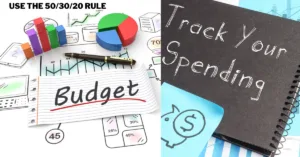
Use the 50/30/20 Rule
One simple way to budget is the 50/30/20 rule. Here’s how it works:
- 50% of your income goes to needs (rent, food, utilities)
- 30% goes to wants (joy, eating out, hobbies)
- 20% goes to savings and debt repayment
This rule gives you a basic framework to follow. You can change the ratios based on your circumstances and objectives.
Track Your Spending
Maintaining an eye on where your money goes is important. You can do this by:
- Writing down all your purchases in a notebook
- Using a budgeting app on your phone
- Checking your bank and credit card statements regularly
By tracking your spending, you’ll spot areas where you might be overspending and find chances to save money.
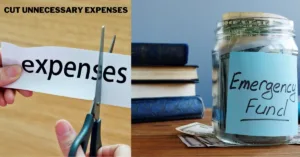
Cut Unnecessary Expenses
Look at your spending and find things you can cut back on. Some ideas:
- Cancel subscriptions you don’t use often
- Cook meals at residence rather than dining out
- Find free or low-cost entertainment options
- Use coupons and look for sales when shopping
- Switch to a more affordable phone or internet plan
Remember, small savings can add up over time!
Build an Emergency Fund
An emergency fund is money set aside for unforeseen expenses or loss of income. Here’s how to start:
- Aim to save 3-6 months’ worth of living expenses
- Start small if you need to – even $500 can help in a pinch
- Keep this money in a separate savings account
- Add to it regularly, even if it’s just a small amount
Having an emergency fund will give you peace of mind and help you avoid going into debt when surprises come up.

Pay Off Debt
If you have debt, make a plan to pay it off. Try these strategies:
- List all your debts with their interest rates
- Pay more than the minimum on your highest-interest debt
- Use the “debt snowball” method: Pay off your smallest debt first, then move to the next smallest
- Consider consolidating your debts if it will give you a lower interest rate
Paying off debt will free up more of your income and reduce stress.
Use Cash for Certain Expenses
For some people, using cash instead of cards can help control spending. Try this:
- Take out a set amount of cash each week for things like groceries or entertainment
- When the cash is gone, stop spending in that category
- This makes it easier to stick to your budget and avoid overspending

Save Automatically
Make saving easier by setting up automatic transfers. Here’s how:
- Ask your employer to split your paycheck between checking and savings accounts
- Set up automatic transfers from your checking to your savings account each month
- Start with a small amount and increase it over time
When saving is automatic, you’re less likely to skip it or spend the money elsewhere.
Review and Adjust Regularly
Your budget isn’t set in stone. Life changes, and your budget should too. Try this:
- Review your budget monthly
- See if you’re meeting your goals
- Adjust your spending categories if needed
- Update your budget when your income or expenses change
Regular reviews help you stay on track and make sure your budget still works for you.
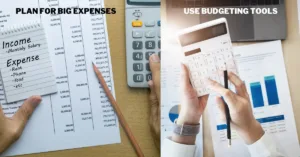
Plan for Big Expenses
Some expenses don’t happen every month but can throw off your budget when they do. Examples include:
- Car repairs
- Holiday gifts
- Annual insurance premiums
- Vacations
To handle these:
- Make a list of these expenses and when they usually happen
- Estimate how much they’ll cost
- Divide that amount by 12 and save that much each month
- Keep this money in a separate savings account
This way, you’ll be ready when these big expenses come up.
Use Budgeting Tools
Many tools can make budgeting easier. Some options:
- Spreadsheet programs like Excel or Google Sheets
- Budgeting apps like Mint, YNAB, or PocketGuard
- Pen and paper, if you prefer
Choose a method that works for you and stick with it.

Look for Ways to Increase Your Income
While cutting expenses is important, increasing your income can also help your financial situation. Some ideas:
- Ask for a raise at work
- Look for a better-paying job
- Start a side business or freelance work
- Sell items you no longer need
Extra income can help you reach your financial goals faster.
Learn About Personal Finance
The more you know about money management, the better decisions you can make. Try these:
- Read personal finance books or blogs
- Listen to money-related podcasts
- Take a free online course about budgeting or investing
- Talk to financially savvy friends or family members
Keep learning and applying new ideas to improve your financial skills.

Be Patient and Persistent
Lastly, remember that good money habits take time to develop. Don’t get discouraged if you make mistakes or if progress seems slow. Keep these points in mind:
- It’s okay to start small – even tiny improvements add up over time
- If you overspend one month, don’t give up – just get back on track the next month
- Celebrate your successes, no matter how small
- Keep your long-term goals in mind to stay motivated
With patience and persistence, you can make real progress in managing your money.
In conclusion, budgeting is a skill that anyone can learn. By following these tips and staying committed to your financial goals, you can take control of your money and build a more secure financial future. Remember, the key is to find a budgeting approach that works for you and stick with it. Good luck on your personal finance journey.
FAQs
Q: Why is budgeting important?
A: Budgeting is essential as it enables you to monitor your income and expenditures. It allows you to manage your money better, avoid debt, save for goals, and make informed spending decisions.
Q: How do I create a budget?
A: To create a budget, start by listing your income and all your expenses. Categorize them into essentials and non-essentials, then allocate amounts for each category to ensure you live within your means.
Q: How can I stick to my budget?
A: To stick to your budget, regularly review your spending and compare it to your budget. Set reminders for bill payments, limit impulse purchases and make adjustments if you find you’re overspending.
Q: What tools can help with budgeting?
A: There are many tools to help with budgeting, such as apps like Mint or You Need a Budget (YNAB). You can also use spreadsheets or simple pen-and-paper methods to track your finances.
Q: How often should I review my budget?
A: It’s best to review your budget monthly. This helps you see if you’re on track, make adjustments for any changes in income or expenses, and ensure you’re meeting your financial goals.
Also Read:
7 Tips on Goal-Setting, Staying Motivated, and Tracking Progress
Tips and strategies for managing time, boosting focus, and staying organized.
Tips and strategies for managing time, boosting focus, and staying organized.
References:
https://www.researchgate.net/publication/279198054_Personal_Financial_Management
https://www.researchgate.net/publication/373599479_Student_Practice_Handling_Personal_Finances
https://en.wikipedia.org/wiki/Personal_budget
Disclaimer:
These budgeting tips are for informational purposes only and not financial advice. Individual circumstances vary, so consult a financial advisor for personalized guidance tailored to your specific needs.
Related post

7 Health Benefits of Assam Tea


